Introduction to Western Culture (西方文化入门)
- 格式:ppt
- 大小:4.76 MB
- 文档页数:25
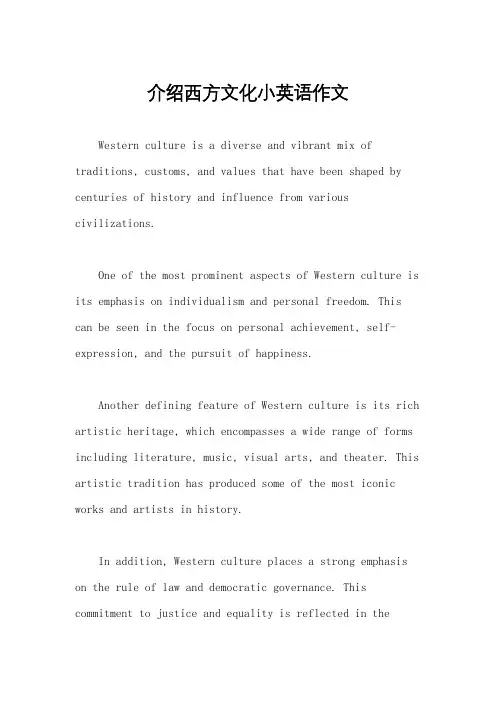
介绍西方文化小英语作文Western culture is a diverse and vibrant mix of traditions, customs, and values that have been shaped by centuries of history and influence from various civilizations.One of the most prominent aspects of Western culture is its emphasis on individualism and personal freedom. This can be seen in the focus on personal achievement, self-expression, and the pursuit of happiness.Another defining feature of Western culture is its rich artistic heritage, which encompasses a wide range of forms including literature, music, visual arts, and theater. This artistic tradition has produced some of the most iconic works and artists in history.In addition, Western culture places a strong emphasis on the rule of law and democratic governance. This commitment to justice and equality is reflected in thelegal systems and political institutions of Western societies.Furthermore, Western culture has a strong tradition of scientific inquiry and technological innovation. This hasled to major advancements in fields such as medicine, engineering, and information technology.Moreover, Western culture has a rich culinary tradition that varies widely from region to region. From Italianpasta to French pastries to American barbecue, the cuisineof the West is as diverse as its people.Finally, Western culture has a strong tradition ofsports and leisure activities, with a wide range of popular pastimes including football, basketball, skiing, and hiking.In conclusion, Western culture is a complex and multifaceted phenomenon that encompasses a wide range of traditions, values, and practices. Its rich history and diverse influences have shaped it into a dynamic and influential force in the world today.。
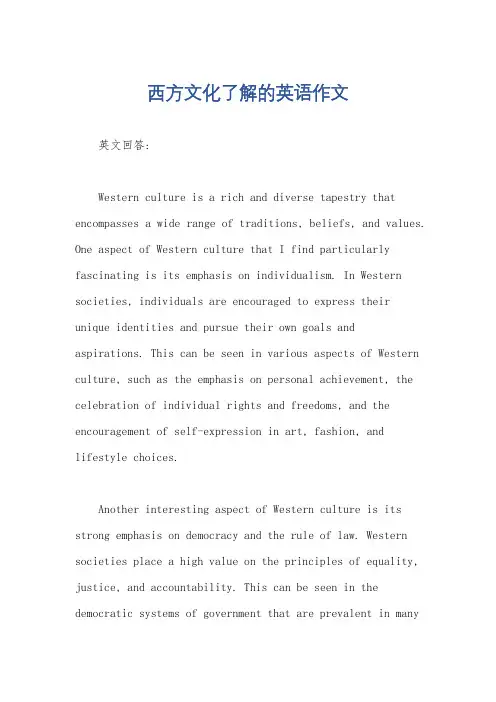
西方文化了解的英语作文英文回答:Western culture is a rich and diverse tapestry that encompasses a wide range of traditions, beliefs, and values. One aspect of Western culture that I find particularly fascinating is its emphasis on individualism. In Western societies, individuals are encouraged to express their unique identities and pursue their own goals and aspirations. This can be seen in various aspects of Western culture, such as the emphasis on personal achievement, the celebration of individual rights and freedoms, and the encouragement of self-expression in art, fashion, and lifestyle choices.Another interesting aspect of Western culture is its strong emphasis on democracy and the rule of law. Western societies place a high value on the principles of equality, justice, and accountability. This can be seen in the democratic systems of government that are prevalent in manyWestern countries, where citizens have the right to vote and participate in decision-making processes. The rule of law ensures that everyone is subject to the same set of laws and regulations, regardless of their social status or position of power.Furthermore, Western culture is known for itsscientific and technological advancements. Western societies have made significant contributions to fields such as medicine, engineering, and information technology. This emphasis on innovation and progress has led to numerous breakthroughs and advancements that have greatly improved the quality of life for people around the world. For example, Western countries have pioneered the development of vaccines, medical treatments, and communication technologies that have revolutionized healthcare and connectivity.In addition, Western culture places a strong emphasis on education and intellectual pursuits. Western societies value knowledge, critical thinking, and intellectual curiosity. This can be seen in the emphasis on formaleducation, the availability of libraries and educational resources, and the promotion of lifelong learning. Western countries have renowned universities and researchinstitutions that attract students and scholars from all over the world, fostering a vibrant intellectual community.中文回答:西方文化是一个丰富多样的织锦,包含了各种传统、信仰和价值观。
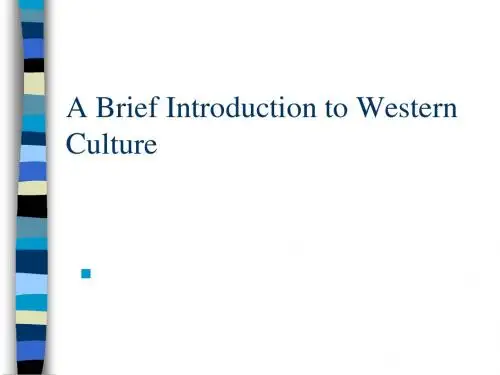
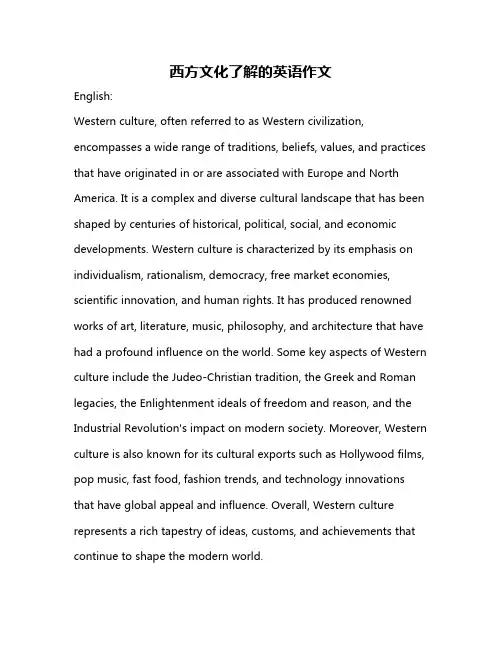
西方文化了解的英语作文English:Western culture, often referred to as Western civilization, encompasses a wide range of traditions, beliefs, values, and practices that have originated in or are associated with Europe and North America. It is a complex and diverse cultural landscape that has been shaped by centuries of historical, political, social, and economic developments. Western culture is characterized by its emphasis on individualism, rationalism, democracy, free market economies, scientific innovation, and human rights. It has produced renowned works of art, literature, music, philosophy, and architecture that have had a profound influence on the world. Some key aspects of Western culture include the Judeo-Christian tradition, the Greek and Roman legacies, the Enlightenment ideals of freedom and reason, and the Industrial Revolution's impact on modern society. Moreover, Western culture is also known for its cultural exports such as Hollywood films, pop music, fast food, fashion trends, and technology innovations that have global appeal and influence. Overall, Western culture represents a rich tapestry of ideas, customs, and achievements that continue to shape the modern world.中文翻译:西方文化,通常被称为西方文明,涵盖了起源于欧洲和北美洲或与之相关的广泛传统、信仰、价值观和实践。
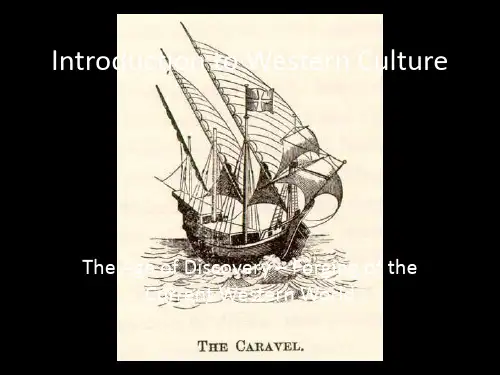
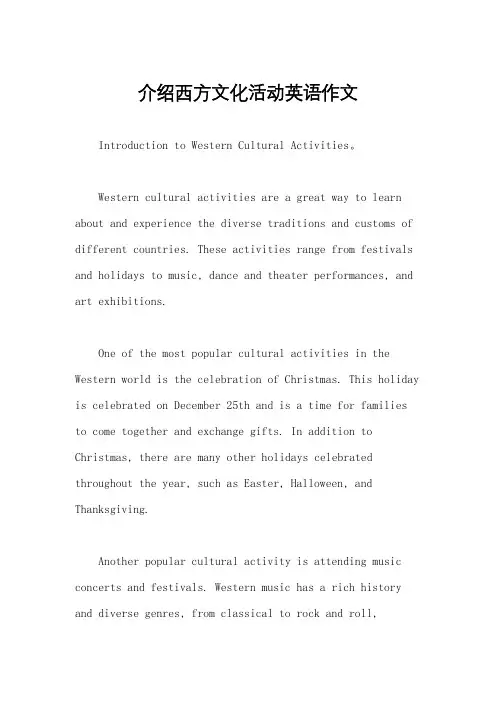
介绍西方文化活动英语作文Introduction to Western Cultural Activities。
Western cultural activities are a great way to learn about and experience the diverse traditions and customs of different countries. These activities range from festivals and holidays to music, dance and theater performances, and art exhibitions.One of the most popular cultural activities in the Western world is the celebration of Christmas. This holiday is celebrated on December 25th and is a time for families to come together and exchange gifts. In addition to Christmas, there are many other holidays celebrated throughout the year, such as Easter, Halloween, and Thanksgiving.Another popular cultural activity is attending music concerts and festivals. Western music has a rich history and diverse genres, from classical to rock and roll,country, and pop. Music festivals such as Coachella, Glastonbury, and Lollapalooza attract thousands of fans from around the world.Theater and dance performances are also an important part of Western culture. Broadway shows in New York City, for example, are world-renowned for their high-quality productions. Ballet and modern dance performances are also popular, with famous companies such as the American Ballet Theatre and the Alvin Ailey American Dance Theater.Art exhibitions and museums are another way to experience Western culture. The Louvre in Paris, the Metropolitan Museum of Art in New York City, and the Tate Modern in London are just a few of the many famous museums that house some of the world's most famous works of art.In addition to these cultural activities, sports are also an important part of Western culture. Soccer, basketball, baseball, and American football are just a few of the many popular sports played and watched in the Western world.In conclusion, Western cultural activities offer a diverse range of experiences that allow people to learn about and appreciate the traditions and customs ofdifferent countries. From festivals and holidays to music, dance, and theater performances, and art exhibitions, there is something for everyone to enjoy.。
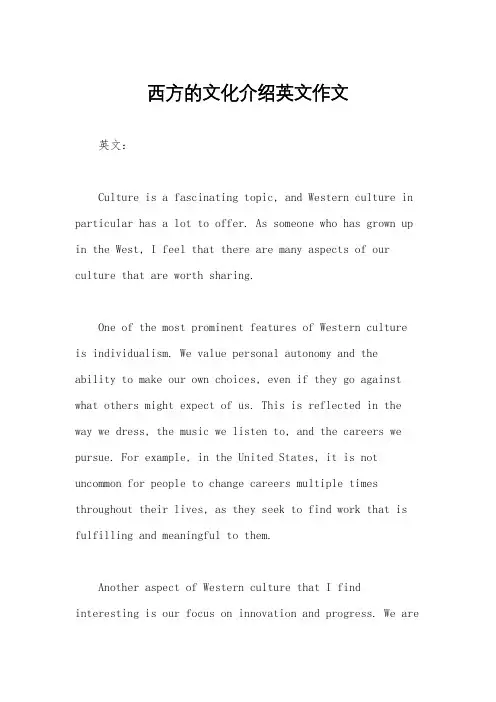
西方的文化介绍英文作文英文:Culture is a fascinating topic, and Western culture in particular has a lot to offer. As someone who has grown up in the West, I feel that there are many aspects of our culture that are worth sharing.One of the most prominent features of Western culture is individualism. We value personal autonomy and theability to make our own choices, even if they go against what others might expect of us. This is reflected in the way we dress, the music we listen to, and the careers we pursue. For example, in the United States, it is not uncommon for people to change careers multiple times throughout their lives, as they seek to find work that is fulfilling and meaningful to them.Another aspect of Western culture that I find interesting is our focus on innovation and progress. We arealways looking for new ways to improve our lives and the world around us, whether that means developing new technologies, exploring new frontiers, or pushing the boundaries of artistic expression. This drive for innovation is what has led to many of the great accomplishments of Western civilization, from the Renaissance to the Industrial Revolution to the space race.Of course, Western culture is not without its flaws. One criticism that is often leveled against us is that we can be overly materialistic and consumerist, focusing too much on accumulating wealth and possessions rather than on building meaningful relationships and pursuing spiritual growth. This is something that I think we need to be mindful of, and work to address in our own lives and in our broader society.Overall, I believe that Western culture has a lot to offer, both in terms of its strengths and its weaknesses. By learning about and engaging with different cultures, we can broaden our perspectives and become more well-rounded individuals.中文:文化是一个迷人的话题,尤其是西方文化有很多值得分享的地方。
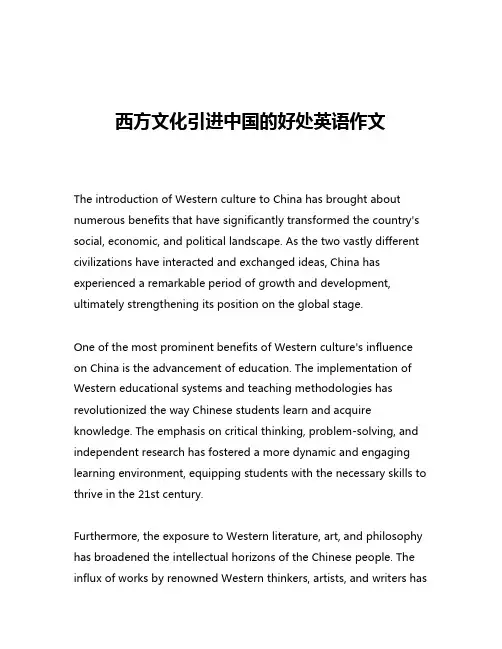
西方文化引进中国的好处英语作文The introduction of Western culture to China has brought about numerous benefits that have significantly transformed the country's social, economic, and political landscape. As the two vastly different civilizations have interacted and exchanged ideas, China has experienced a remarkable period of growth and development, ultimately strengthening its position on the global stage.One of the most prominent benefits of Western culture's influence on China is the advancement of education. The implementation of Western educational systems and teaching methodologies has revolutionized the way Chinese students learn and acquire knowledge. The emphasis on critical thinking, problem-solving, and independent research has fostered a more dynamic and engaging learning environment, equipping students with the necessary skills to thrive in the 21st century.Furthermore, the exposure to Western literature, art, and philosophy has broadened the intellectual horizons of the Chinese people. The influx of works by renowned Western thinkers, artists, and writers hasenriched the cultural landscape, inspiring Chinese scholars and creatives to engage in cross-cultural dialogues and explore new avenues of expression. This exchange of ideas has led to the emergence of a more diverse and vibrant cultural scene, where traditional Chinese values coexist harmoniously with Western influences.The economic benefits of Western culture's integration into China are also undeniable. The adoption of Western business practices, management strategies, and technological innovations has propelled China's economic growth to unprecedented levels. The incorporation of Western financial systems, investment models, and marketing techniques has enabled Chinese companies to become more competitive in the global marketplace, attracting foreign investment and expanding their reach beyond the country's borders.Moreover, the introduction of Western consumer culture has transformed the lifestyle and purchasing habits of the Chinese population. The availability of a wider range of products, services, and entertainment options has not only diversified the consumer landscape but also encouraged the development of a thriving middle class. This shift in consumer behavior has contributed to the overall economic prosperity of the nation, as the growing demand for goods and services fuels the country's industrial and commercial sectors.In the realm of social and political reforms, the influence of Western culture has been instrumental in shaping China's transformation. The promotion of democratic principles, human rights, and the rule of law has inspired Chinese citizens to advocate for greater individual freedoms and civil liberties. While the pace of these reforms may vary, the gradual integration of Western values has undoubtedly challenged the traditional power structures and encouraged a more open and inclusive political discourse.Furthermore, the exposure to Western media, communication technologies, and social platforms has empowered the Chinese people to access a broader range of information, connect with the global community, and voice their opinions more freely. This increased access to information and the ability to engage in cross-cultural exchanges have fostered a more informed and engaged citizenry, contributing to the ongoing process of social and political evolution in China.Additionally, the influence of Western culture has had a positive impact on China's approach to environmental protection and sustainability. The adoption of Western environmental regulations, clean energy technologies, and eco-friendly practices has helped China address pressing environmental challenges, such as air pollution, water scarcity, and the preservation of natural habitats. This shift towards a more sustainable development model has notonly improved the quality of life for Chinese citizens but also positioned the country as a global leader in the fight against climate change.In the realm of healthcare, the integration of Western medical practices and technologies has revolutionized the Chinese healthcare system. The introduction of advanced diagnostic tools, surgical techniques, and pharmaceutical innovations has greatly improved the quality of medical care, leading to better health outcomes for the Chinese population. Furthermore, the collaboration between Chinese and Western healthcare professionals has facilitated the exchange of knowledge and the development of more comprehensive and effective treatment protocols.Finally, the exposure to Western cultural traditions and customs has enriched the social fabric of China, fostering a greater appreciation for diversity and cross-cultural understanding. The incorporation of Western festivals, cuisines, and recreational activities has not only broadened the cultural horizons of the Chinese people but also encouraged the preservation and celebration of their own unique heritage. This cultural exchange has strengthened the bonds between China and the global community, promoting mutual understanding and respect.In conclusion, the integration of Western culture into China hasbrought about a myriad of benefits that have transformed the country in significant ways. From advancements in education and the economy to social and political reforms, the influence of Western culture has contributed to China's remarkable progress and solidified its position as a global powerhouse. As China continues to navigate the challenges and opportunities presented by this cultural exchange, the country's future remains bright, with the potential to forge even stronger ties with the rest of the world.。

Introduction to Western Culture ReviewWhat is Western Culture?: Western culture is a term used very broadly to refer to a heritage of social norms, ethical values, traditional customs, belief systems, political systems, and specific artifacts and technologies that have some origin or association with Europe.Western culture is the product of TWO major cultural systems:1)Graeco-Roman culture;2)and Christianity.Why should we study Western culture?Elements of Western culture have had a very influential effect on other cultures worldwide.Ancient Greek history (776BC - 600AD) can be divided into the following periods:∙The Archaic period (c. 800 – c. 500 BC).∙The Classical period (c. 500 – 323 BC).∙In the Hellenistic period (323–146 BC)Much of modern Western politics, artistic thought, such as architecture, scientific thought, literature, and philosophy derives from this period of Greek history. Greek history is dominated by Athens, the source of much of the political thought, religion, literature, art and philosophy which survives to this day.Key PointsReligion: A polytheistic (多神论) religion●Political: Divided into many self-governing city-states through Greece’s geography. Most cities originallygoverned by an oligarchy (寡头政治)but challenged by the tyrants (篡权者,僭主) and became democracies (民主)●Colonisation: Rapidly increasing population lead to the colonisation (殖民)of much of the areas around theMediterranean, spreading Greek culture●Economy & Trade: Slave economy. Traded widely throughout the Mediterranean●Athenian democracy (550BC): Rule by adult male citizens with equality under the law●Epic Poetry:A long narrative poem usually concerned with heroes or heroic deeds important to a nation.The most important poems were The Iliad <<伊利亚特>> and The Odyssey 《奥德赛》(古希腊史诗,作者为荷马)Ancient Roman culture is the refinement (改良)of the innovation of the Greeks. This is why this period of Western history is often called the Graeco-Roman or the Classical period.The Historical Development of Ancient Rome●Rome began as a small village on the Tiber around 800 BC●Early Rome gradually expanded itself to become the leading city in Italy●Early Roman history was marked by the reign of the seven Kings, all of which were elected by the peoplefor life. After the tyrannical reign of Tarquinius Superbus●Rome became a Republic in 509 BC, ruled by its citizens (like Athens)●In 27 AD, Rome became an Empire. The Roman Empire was quite different from the Chinese Empire -Emperors were more often than not chosen by the army and not the son of the previous Emperor.●The Emperor was a GodRoman Society●The basic social structure of Rome in the early period was of the farmer-soldier-citizen (the plebeians 老百姓) and a residual aristocracy (贵族)holding most of the political power.●Roman society was established as a hierarchy based on legal distinctions between the ruling class and theruled, the rich and the poor, the aristocracy and the common people, the citizen and the non-citizen, the free and the slaves●The empire was multiculturalRoman Law:Roman law was codified and formed the basis of the large majority of Europe (and then the world’s) legal system.Roman Economy:The economy was highly developed. The economy was based on inter-imperial trade. The economy was heavily monetized (used money not goods (物品)to trade)Roman Religion: Polytheistic and based mostly on Greek religionRoman Literature●Virgil (70 - 19BC): The great writer of epic poetry, his masterwork was The Aeneid●Ovid (43BC - 17AD): Ovid’s masterpiece was The Metamorphoses, a collection of 250 stories and mythsfrom the Roman Empire. These stories have provided much of the foundation for later Western literature, drama and art.Roman Architecture and Art●Heavily influenced by the Greeks●Developed the ability to construct and arch/dome●Used concrete and glassJewish Culture and the Old TestamentIntroduction:●Jewish culture is the culture of the Jewish people●Jewish culture is 3000 years old. Jewish culture began in the Middle East in the Bronze Age (青铜时代)●Jewish culture is the origin of the Abrahamic (.亚伯拉罕的) religions (Judaism犹太教Christianity 基督教Islam 伊萨兰教)●The Jewish people are an ethnoreligious (宗教民族)people●Judaism is a monotheistic (one god) religion●Currently there are estimate to be 12 million Jews, mostly living in Israel and the United States●The Old Testament (旧约全书)●The major contribution that Judaism has made to Western culture is the Tanakh, known as the OldTestament in Christianity.●The Old Testament is composed of 24 - 51 Books, depending on which version you read.●The Old Testament contains the story of how God created the world, the history of the Jewish people, thelaws of the Jewish people and the prophecies of the Messiah.Christianity and the New TestamentIntroduction●Christianity is the most important religion in Western culture.●Christianity is a monotheistic religion (one god) based on the life of Jesus Christ presented in the NewTestament●In the past, Christianity exerted a high level of influence on Western social and intellectual life, as well asthe life of the common people.●Christianity is not a unified religion - it is divided into the main sects (派别)of Catholic (天主教)EasternOrthodox (东正教)and Protestant (新教教)Christianity.●Currently, there are around 2.2 billion Christians worldwide.Fundamental Beliefs in ChristianityChristians believe in the Original Sin - that man is sinful (罪孽)。
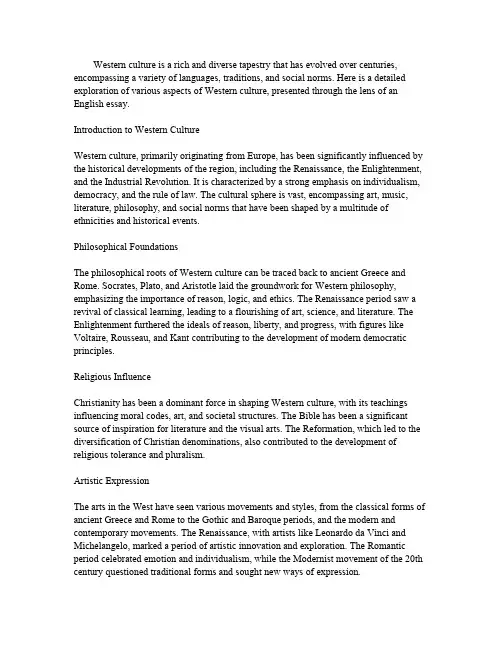
Western culture is a rich and diverse tapestry that has evolved over centuries, encompassing a variety of languages,traditions,and social norms.Here is a detailed exploration of various aspects of Western culture,presented through the lens of an English essay.Introduction to Western CultureWestern culture,primarily originating from Europe,has been significantly influenced by the historical developments of the region,including the Renaissance,the Enlightenment, and the Industrial Revolution.It is characterized by a strong emphasis on individualism, democracy,and the rule of law.The cultural sphere is vast,encompassing art,music, literature,philosophy,and social norms that have been shaped by a multitude of ethnicities and historical events.Philosophical FoundationsThe philosophical roots of Western culture can be traced back to ancient Greece and Rome.Socrates,Plato,and Aristotle laid the groundwork for Western philosophy, emphasizing the importance of reason,logic,and ethics.The Renaissance period saw a revival of classical learning,leading to a flourishing of art,science,and literature.The Enlightenment furthered the ideals of reason,liberty,and progress,with figures like Voltaire,Rousseau,and Kant contributing to the development of modern democratic principles.Religious InfluenceChristianity has been a dominant force in shaping Western culture,with its teachings influencing moral codes,art,and societal structures.The Bible has been a significant source of inspiration for literature and the visual arts.The Reformation,which led to the diversification of Christian denominations,also contributed to the development of religious tolerance and pluralism.Artistic ExpressionThe arts in the West have seen various movements and styles,from the classical forms of ancient Greece and Rome to the Gothic and Baroque periods,and the modern and contemporary movements.The Renaissance,with artists like Leonardo da Vinci and Michelangelo,marked a period of artistic innovation and exploration.The Romantic period celebrated emotion and individualism,while the Modernist movement of the20th century questioned traditional forms and sought new ways of expression.Literature and LanguageWestern literature is diverse,ranging from the epic poetry of Homer to the philosophical novels of Dostoevsky and the existential works of Camus.The development of the printing press in the15th century democratized the distribution of written works,leading to an increase in literacy and the spread of ideas.English,as one of the most widely spoken languages in the world,has been a significant carrier of Western cultural values and ideas.Musical TraditionsWestern music has a rich history,from the sacred music of the medieval period to the complex compositions of the Baroque era,the classical symphonies of Mozart and Beethoven,and the diverse genres of the20th century,including jazz,rock,and electronic music.The development of music theory and notation has allowed for the preservation and dissemination of musical works across generations.Social and Political StructuresThe social and political structures of Western culture have been marked by the evolution from feudalism to modern democracies.The Magna Carta,the American Declaration of Independence,and the French Revolution are key events that have shaped the principles of individual rights,representation,and the separation of powers.Culinary HeritageWestern cuisine is as varied as its cultures,with French,Italian,Spanish,and British cuisines being some of the most renowned.The use of dairy products,meats,and a variety of grains is common,and the emphasis on the quality of ingredients and the presentation of dishes is a hallmark of Western culinary traditions.ConclusionWestern culture is a complex and everevolving entity,shaped by a multitude of historical, philosophical,artistic,and social influences.It continues to influence and be influenced by global cultures,making it a dynamic and integral part of the worlds cultural landscape. Understanding Western culture requires an appreciation of its depth and diversity,as well as an awareness of its ongoing impact on contemporary society.。
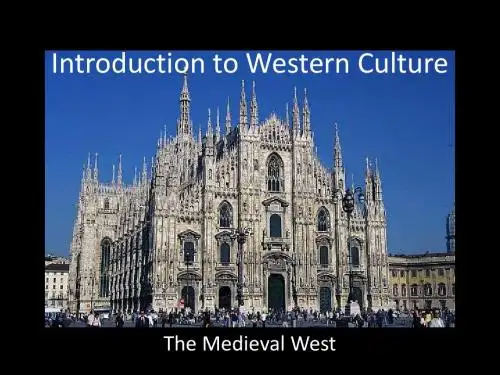
西方文化引进中国的好处英语作文Title: The Benefits of Western Culture Being Introduced to ChinaEnglish Essay:The integration of Western culture into Chinese society has brought about numerous benefits, enriching the cultural landscape and fostering a more global perspective among the Chinese people. The influx of Western ideas, values, and practices has contributed to social, economic, and technological advancements in China.One of the key advantages of Western culture's influence on China is the exposure to new ideas and perspectives. The exchange of cultural values has facilitated a moreopen-minded and inclusive society, encouraging Chinese individuals to consider diverse viewpoints and think critically about various issues. This has led to a more dynamic and innovative environment, where people are encouraged to question traditional norms and explore new ways of thinking.Moreover, the introduction of Western business practices and technologies has played a significant role in China's economic growth. Western management techniques and entrepreneurial spirit have inspired Chinese businesses toadopt more efficient and innovative strategies, resulting in increased productivity and economic prosperity. Additionally, the adoption of Western technology has accelerated China's progress in fields such as telecommunications, internet, and artificial intelligence.Western education systems, with their focus on individualism, critical thinking, and creativity, have also positively impacted Chinese society. The integration of Western educational practices has encouraged Chinese students to pursue their passions, develop their unique talents, and strive for excellence. This has not only led to a more well-rounded education but has also contributed to the cultivation of a generation of leaders and innovators.Furthermore, the exposure to Western arts, literature, and entertainment has enriched Chinese cultural life. The popularity of Western films, music, and fashion has provided Chinese citizens with a broader range of cultural experiences, enhancing their quality of life and fostering a sense of cultural diversity and tolerance.In conclusion, the introduction of Western culture to China has brought about numerous benefits, fostering social progress, economic development, and the cultivation ofinnovative thinking. The integration of Western ideas and values has contributed to a more open and inclusive society, where individuals are encouraged to explore new perspectives and push the boundaries of traditional norms. The continued exchange and融合of Western and Chinese cultures will undoubtedly continue to benefit both societies in numerous ways.中文翻译:西方文化融入中国社会带来了许多好处,丰富了文化景观,并使中国人民更加具有全球视野。
介绍西方文化英语作文Western culture is incredibly diverse and rich, encompassing various traditions, customs, arts, and values. 西方文化非常多样丰富,包括各种传统、风俗、艺术和价值观。
From music and fashion to literature and food, Western culture has greatly influenced societies around the world. 从音乐和时尚到文学和食物,西方文化对世界各国的社会产生了深远影响。
One of the most prominent aspects of Western culture is its emphasis on freedom and individualism. 西方文化最明显的特点之一是强调自由和个人主义。
This can be seen in the democratic political systems of many Western countries, as well as in the importance placed on personal choice and autonomy in everyday life. 这可以在许多西方国家的民主政治体制中看到,也可以在日常生活中个人选择和自主决定的重要性中体现出来。
Art and literature play a significant role in Western culture, with renowned artists and writers such as Leonardo da Vinci, Shakespeare, and Van Gogh shaping the artistic landscape. 艺术和文学在西方文化中扮演着重要角色,著名艺术家和作家如达芬奇、莎士比亚和梵高塑造了艺术风景。